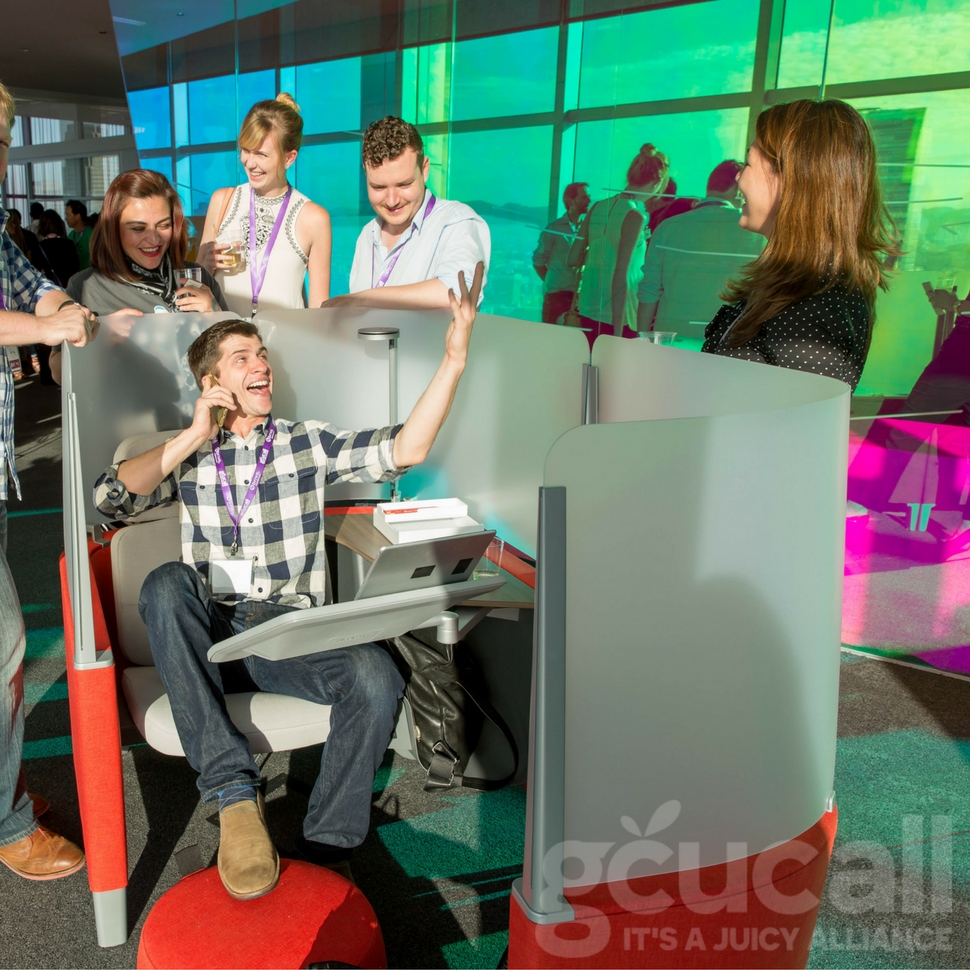Feature image: GCUCALL May, 2016
by Roxette Miranda, Workspace Specialist for WUN who works in the Miami Office. WUN is an industry leader in providing a complete package for software, data, internet, voice, as well as 24/7 door access for Coworking and shared spaces. Currently, she works with several locations and has a passion to keep to her Latin American roots by collaborating with spaces there as well as all over the world. This year she was on the host committee for GWA.
Roxette makes sure that anyone new to Coworking are welcomed in a way that has become customary in her culture.
One of the biggest drives I have for working from Miami (where I am from), and as the Marketing Manager for WUN Systems, is to do as much as I can to help advance the trend of Miami becoming a “tech hub”. While all eyes are on the rapid expansion of Magic Leap, I see the real forefront right outside my office window looking over the busy street of Biscayne Boulevard. I’m talking about start-up culture.
It’s here, between the beaches and glowing skyline, where I see the big ideas blossoming. Yet, as in with many other locations, this wouldn’t have or wouldn’t still be possible if it weren’t for coworking.
Coworking has enabled technology and startup culture to thrive together.
The Most Overlooked Innovation: Community.
By the numbers, Miami ranks in the Kauffman index as the second most entrepreneurial city in the US with the highest startup density of 247.6 startups per 100,000 people. While we’re still ways away from being on the level of Silicon Valley, we nonetheless have a serious ecosystem on our heels.
Before joining WUN Systems and dedicating myself to find ways to better connect the coworking industry, I was familiar with such as The LAB—a true South Florida success story. Recently, The LAB received a significant investment from the Knight Foundation to help solidify the relationship between the startup community and established corporations.
Part of the success of The LAB is due to the beautiful and integrated technology it has; it is well connected within the wires and WiFi, but the key component of its technology is culture.
Centered in the heart of the Wynwood Arts District, The LAB represents new ideas from a new generation and establishes itself as a place where unique voices can come together and rewrite the rules. Which it has. The reason for this is because this place is optimized for community.
Coworking environments don’t just create opportunities, they breathe them. By providing amenities such as easier network capabilities and access to conference rooms, collaboration happens on a square-inch basis. Not to mention meet-ups, events, and classes created for coming together.
The New Component That Counts: The Freelancers of The Future.
New technology, software, firmware, and hardware solutions are being centered around “the gig economy.” It’s not just startups with their businesses, but the generation of millennial sellswords who are cementing a foundation through excellence in freelance work.
These guys just set up shop where they see fit. (Hence the rising popularity of flexible workspaces as the gig economy grows.)
They have crafted an industry where there is no getting fired. According to a study published by the United States Department of Labor in 2015, 53 Million Americans earned an income through freelance work…literally 1 in 3 workers. The reality is that new businesses are taking advantage of this change, opting for more on-demand services without increasing their overhead.
In this regard, many businesses both small and large agree that coworking spaces offer the best avenues. These workspaces offer clients special access to training rooms, media labs, and the use of expensive equipment that would not be afforded otherwise.
It’s Not Just Tech…For Tech
Other industries are thriving too under the workspace-as-a-service industry.
This has increased the demand for technologies to be more flexible and on the move. According to an article by CRAIN’S New York Business, “Behind the rush toward co-working spaces is the growth of the freelance economy and the venture capital flowing into local startups that are the sector’s target market. Venture funding in New York increased 49% from 2014 to 2015 to reach $7 billion, according to research firm CB Insights. Meanwhile, there are 4.7 million freelancers in the New York metro region, according to a 2015 report commissioned by the Freelancers Union and Upwork.”
Not to mention, there is still room to grow.
New industries are getting more involved as their eyes are opening to the advantages of sharing the workspace. As stated by a recent article by The Guardian, “With co-living and co-working hubs fulfilling all our needs, co-working is quite clearly here to stay. If the term ever disappears, it will only be because it becomes synonymous with our notion of working.”
I’m excited to see the new opportunities that arise.
I think the true miracle to the rise of coworking is attributed to the continuous growth of community and seeing companies of all sizes, as well as workers of all calibers, work together to build something great.
Coworking is about building those bridges and making better connections: through people, through networking, and through openness.


















